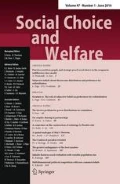Abstract
There are alternative ways of decomposing a given fuzzy weak preference relation into its antisymmetric and symmetric components. In this paper I have provided support to one among these alternative specifications. It is shown that on this specification the fuzzy analogue of the General Possibility Theorem is valid even when the transitivity restrictions on the individual and the social preference relations are relatively weak. In the special case where the individual preference relations are exact but the social preference relation is permitted to be fuzzy it is possible to distinguish between different degrees of power of the dictator. This power increases with the strength of the transitivity requirement.
Similar content being viewed by others
References
Arrow KJ (1963) Social choice and individual values, 2nd edn. Wiley, New York
Barrett CR, Pattanaik PK, Salles M (1986) On the structure of fuzzy social welfare functions. Fuzzy Sets Syst 19: 1–10
Basu K (1984) Fuzzy revealed preference theory. J Econ Theory 32: 212–227
Dutta B (1987) Fuzzy preferences and social choice. Math Soc Scie 13: 215–229
Gibbard A (1969) Intransitive social indifference and the Arrow dilemma. Mimeographed
Obchinnikov SO (1981) Structure of fuzzy binary relations. Fuzzy Sets Syst 6: 169–195
Sen AK (1985) Social choice theory. In: Arrow KJ, Intrilligator MJ (eds) Handbook of mathematical economics, vol. 3. North-Holland, Amsterdam
Yager RR (1980) On a general class of fuzzy connectives. Fuzzy Sets Syst 3: 235–242
Zimmermann HJ (1985) Fuzzy set Theory and its applications. Kluwer-Nijhoff, Hingham MA
Author information
Authors and Affiliations
Additional information
For comments on an earlier version of the paper I am indebted to an anonymous referee, an anonymous member of the Board of Editors and to participants in the 1991 Annual Conference of the Indian Econometric Society at North Bengal University, India. However, I retain sole responsibility for any error(s) that the paper may contain.
Rights and permissions
About this article
Cite this article
Banerjee, A. Fuzzy preferences and Arrow-type problems in social choice. Soc Choice Welfare 11, 121–130 (1994). https://doi.org/10.1007/BF00179208
Received:
Accepted:
Issue Date:
DOI: https://doi.org/10.1007/BF00179208



